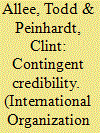| Srl | Item |
| 1 |
ID:
106246


|
|
|
|
|
| Publication |
2011.
|
| Summary/Abstract |
During the past few decades governments have signed nearly 2,700 bilateral investment treaties (BITs) with one another in an attempt to attract greater levels of foreign direct investment (FDI). By signing BITs, which contain strong enforcement provisions, investment-seeking governments are thought to more credibly commit to protecting whatever FDI they receive, which in turn should lead to increased confidence among investors and ultimately greater FDI inflows. Our unique argument is that the ability of BITs to increase FDI is contingent on the subsequent good behavior of the governments who sign them. BITs should increase FDI only if governments actually follow through on their BIT commitments; that is, if they comply with the treaties. BITs allow investors to pursue alleged treaty violations through arbitration venues like the International Centre for the Settlement of Investment Disputes (ICSID), a heavily utilized and widely observed arbitral institution that is part of the World Bank. Being taken before ICSID, then, conveys negative information about a host country's behavior to the broader investment community, which could result in a sizeable loss of future FDI into that country. We test these contingent effects of BITs using cross-sectional, time-series analyses on all non-OECD countries during a period spanning 1984-2007. We find that BITs do increase FDI into countries that sign them, but only if those countries are not subsequently challenged before ICSID. On the other hand, governments suffer notable losses of FDI when they are taken before ICSID and suffer even greater losses when they lose an ICSID dispute.
|
|
|
|
|
|
|
|
|
|
|
|
|
|
|
|
| 2 |
ID:
119542


|
|
|
| 3 |
ID:
106862


|
|
|
|
|
| Publication |
2011.
|
| Summary/Abstract |
Sovereign investment, particularly by Sovereign Wealth Funds, constitutes an increasingly important portion of foreign investment. In 2009, Sovereign Wealth Funds invested US$22.9 billion in foreign direct investment, 15 per cent more than in 2008.1 Investment treaties protect investments of investors of the contracting parties. Whether sovereign investors benefit from investment treaty protection depends on the definitions of "investor" and "investment" in an otherwise applicable investment treaty. Investments made by sovereign investors are clearly protected under an investment treaty if these definitions expressly include the State, State entities and companies and their investments. This article addresses the more difficult question of protection where the definitions are silent or ambiguous as to whether sovereign investment is covered. Also addressed are the evolving standards of admission of sovereign investment and access of sovereign investors to investor-State arbitration, ICSID arbitration constituting a special case.
|
|
|
|
|
|
|
|
|
|
|
|
|
|
|
|